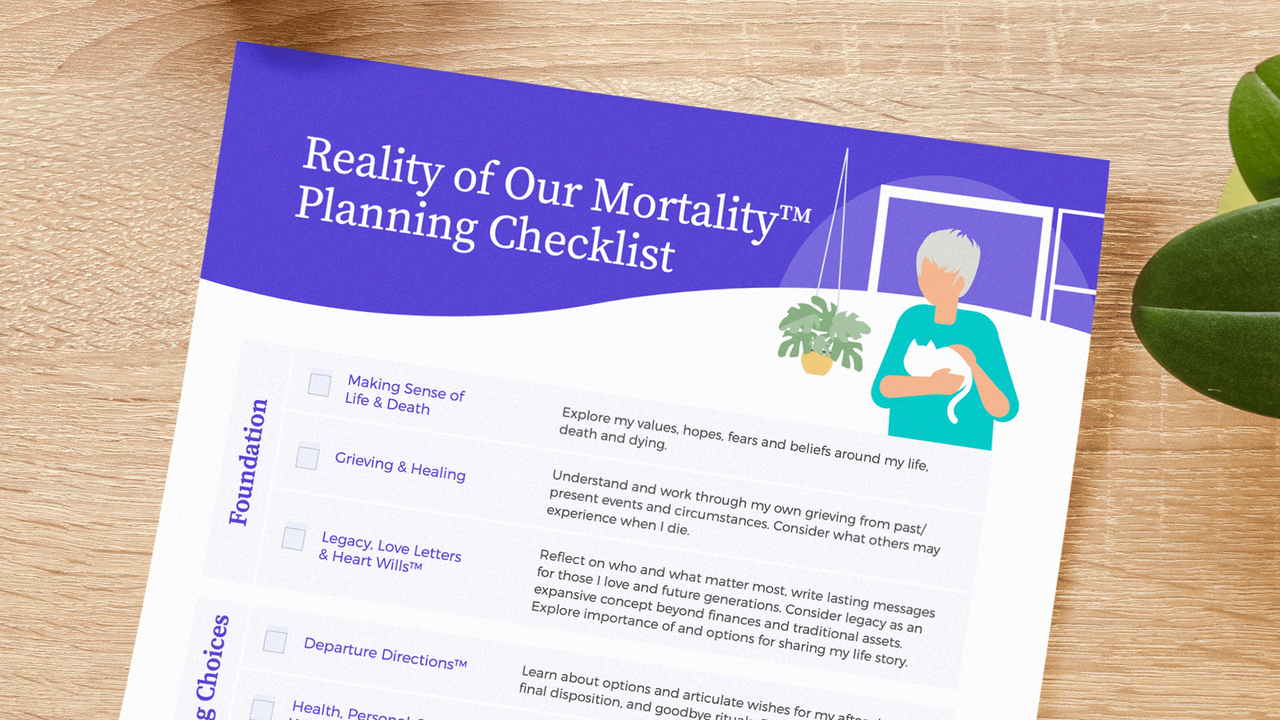
What the “F” is doing in end-of-life planning and 3 steps to get unstuck
Aug 24, 2021If you haven’t started or completed your end-of-life planning, it’s probably because you’re stuck. And to get unstuck, you need to do the foundational work first! One thing that sets Willow’s free,
Reality of Our Mortality™ Planning Checklist apart from other lists is the focus on the “F” word: Foundation.
The foundational work of making sense of life and death before making practical arrangements helps ensure that all of your choices, tasks, and actions, reflect your values and priorities. Ensuring that your values and priorities are identified and expressed in your planning is key because if not, you’ll be at risk of not completing what you started or making choices that just aren’t right for you.
Generate joy and ease.
An often unexpected result of this foundational work is that it leads you to contemplate the reality of your mortality in ways that enrich, energize and connect you to yourself and others. You may find that getting your affairs in order actually generates joy and ease.
The Foundation category of the Reality of Our Mortality™ Planning Checklist has three topics:
- Making Sense of Life & Death
- Grieving and Healing
- Legacy, Love Letters & Heart Wills
Your mortality is an opportunity in disguise.
The first topic, Making Sense of Life & Death refers to exploring your values, hopes, fears and beliefs around your life and your death. If you’ve ever consciously contemplated your mortality, either spiritually or otherwise, that would fall under this topic. We think it’s so important to get on the path of making sense of life and death, that we pulled together our most effective coaching tools and created both a 7 Tools workbook and an online program to help you move through this area.
If you’ve never mourned a significant loss, your tears may be stuck.
The second topic is Grieving and Healing. This is about understanding and working through your grief from past or present events and circumstances and imagining what others may experience when you die. For example, some of us have never had permission to mourn a loss. And by loss, we’re not just talking about a death. It could be an ending or transition of any kind, like moving from your home or ending a job or relationship.
Stuck tears can stop you from experiencing not only the grief but also the joy of life. Unexpressed grief can also prevent you from preparing for your own inevitable death. Our free tool, called “A Brief on Grief and Mourning” says more about the impact and importance of this topic.
Discover who and what matter most.
The final topic inside the Foundation category is Legacy, Love Letters & Heart Wills. This is about reflecting on who and what matter most and writing lasting messages for those you love and future generations. A Legacy Love Letter™ is a personal message written to a particular someone as if it will be the last message they ever receive from you. A Heart Will™, on the other hand, is intended for a wider audience. It could be a statement read at your funeral or end-of-life ritual, or it could be left with your other important documents. Your Heart Will™ may include life lessons, favourite memories, or sharing of some aspect of your life’s journey.
In this topic area you also consider legacy as an expansive concept beyond financial and traditional assets. Legacy here includes the impact your life has and will continue to have on your community and the world after you die.
Live and love fully now.
When you start thinking about what you want to have in place, or what you want to happen at the end of your life, it’s natural to think about what’s in place now and how you’re living your life now. It’s no coincidence that the first category on the list is Foundation. The foundational work ensures that you’ll get your end-of-life planning done in a way that reflects your true self, and at the same time live your fullest and most inspired life!
With all our love,
Reena + Michelle



